

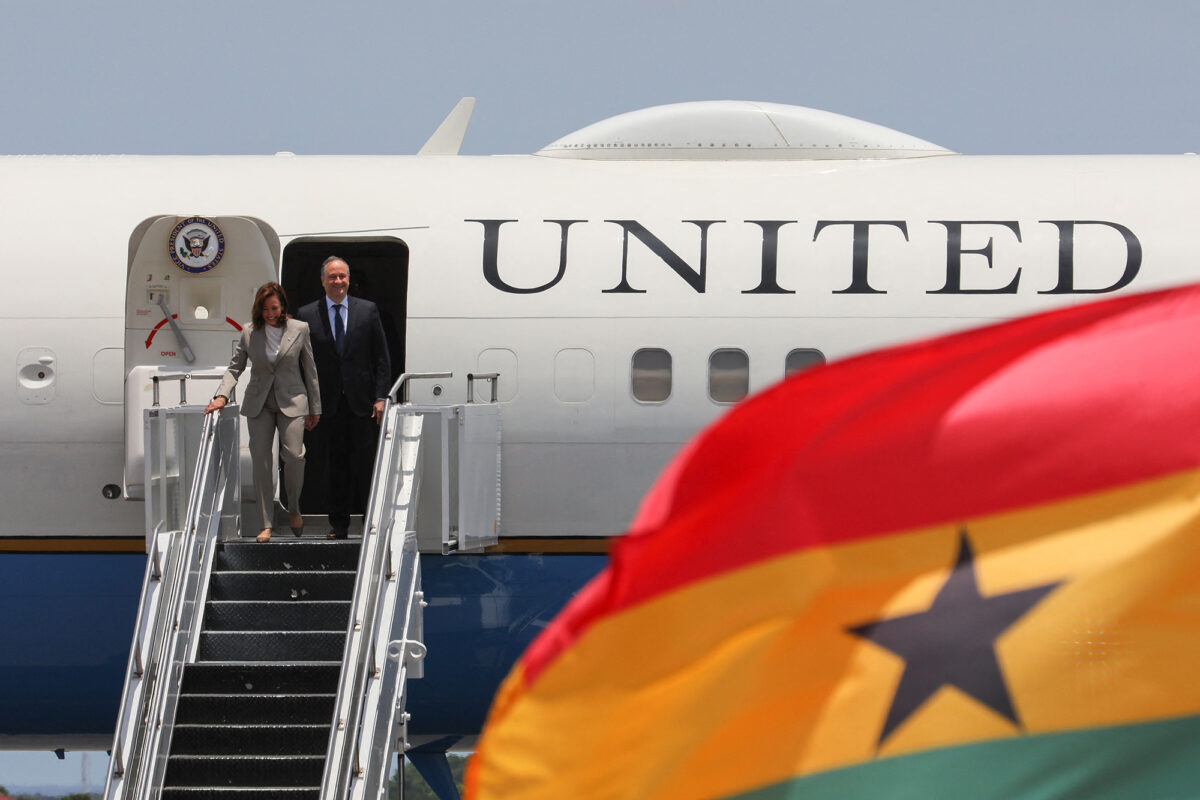
Vice President Kamala Harris has announced a new era of partnership between the United States and African nations amid growing competition from other global powers, especially China and Russia.
Harris arrived in Zambia on March 31 for the final stop of her week-long trip across the continent that also took her to Ghana and Tanzania.
The visit sought to build on December’s U.S.-Africa summit in Washington that saw Harris pledging more than $1 billion in public and private money for economic development, $100 million for security assistance in West Africa, and $500 million to facilitate trade with Tanzania.
Harris is the fifth top Biden administration official to visit Africa this year.
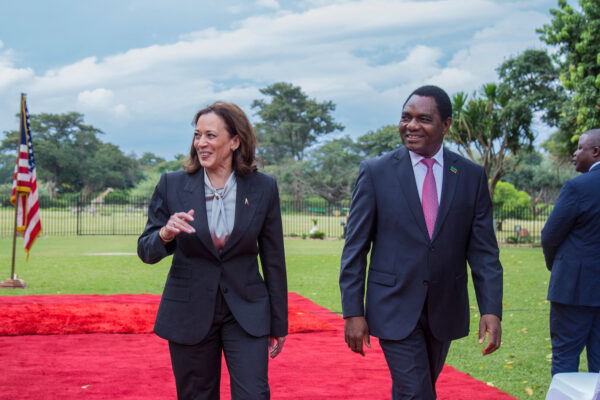
U.N. Ambassador Linda Thomas-Greenfield and Treasury Secretary Janet Yellen came in January, first lady Jill Biden visited in February, and Secretary of State Antony Blinken made the trip in March.
President Joe Biden plans to visit Africa later this year.
While Blinken’s visit to Ethiopia and Niger focused on the countries’ security challenges, the vice president’s tour took her to nations facing serious economic problems.
Ghana’s once-thriving economy is going through its most difficult financial crisis in decades caused by the adverse effects of the global pandemic and the Ukraine crisis.
While in Zambia, Harris called on the landlocked central-south African country’s creditors to finalize the debt restructuring for Zambia as its continued delay is negatively affecting that nation’s economy.
The global COVID-19 pandemic had a devastating impact on Tanzania’s economy, resulting in an estimated 1 million Tanzanians being pushed back into poverty.
“We must work together as the international community to ease the debt burden that is facing far too many countries,” Harris said during the first lap of her tour in Ghana.
“In particular on this trip, I intend to do work that is focused on increasing investments here on the continent and facilitating economic growth and opportunity,” she said.
Beyond these considerations, the three countries are also symbolic for cultural, political, and economic reasons, says Tibor Nagy, former U.S. assistant secretary of state for African affairs.
“All there are democracies and free market economies,” Tibor, who is currently Professor Emeritus at Texas Tech University, told The Epoch Times in an email.
“Ghana has been especially adept at providing a heritage and “home” for African-Americans whose ancestry was stripped by the evils of slavery.
“Tanzania, since President Samia Suluhu Hassan replaced the deceased Magufuli, has made dramatic progress in advancing democracy and political liberalization—and Hassan, as the only female African head of government, is a natural match for VP Harris,” he said.
Zambia, meanwhile, offers another exceptional reformer in President Hakainde Hichilema, who on coming to power found that his country was much more indebted to China than anyone suspected.
“Zambia needs help to restructure its debt and the Chinese are not helping. In addition, Zambia has a personal connection for Harris, who visited the country when her grandfather worked there.”
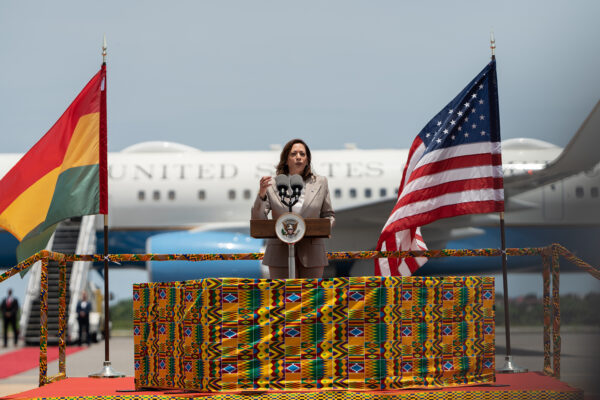
Harris held bilateral meetings with the leaders of each of the three nations, visited Ghana’s Cape Coast slave castle, and traveled down a dirt road to tour a farm outside Zambia’s capital that’s using new techniques and technology to boost its vegetable crop as she highlighted ways to secure food supplies in an age of global warming.
Her visit comes in the wake of the second-ever U.S.-Africa Leaders Summit, held in December 2022.
That brought together about 49 African heads of state and resulted in several major commitments from the United States including a $55 billion pledge to support the African Union’s Agenda 2063; the creation of a new Digital Transformation with Africa (DTA) initiative intended to invest more than $350 million in financing Africa’s digital transformation; and President Biden’s endorsement for the inclusion of the African Union (AU) as a permanent member of the G-20.
While the commitments taken at the summit span many topics—including partnering on human rights, democracy, and gender inclusion—one topic that featured prominently during Harris’ visit is deepening trade and investment between the United States and Africa.
Simply promising and delivering yet more aid to Africa, however, won’t help develop the continent or advance U.S. interests, according to Joshua Meservey, Senior Fellow at the Washington-based Hudson Institute research think.
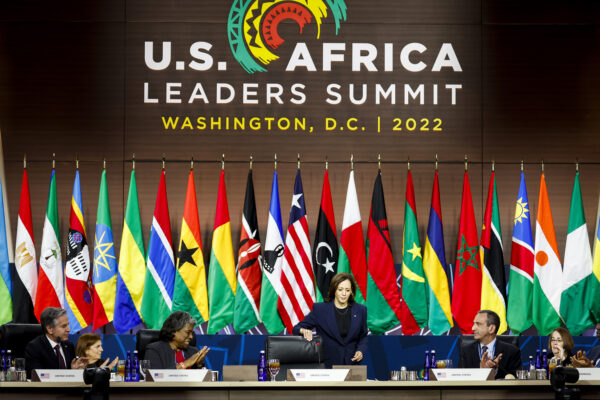
“The U.S. shouldn’t be foolish enough to try to go dollar-for-dollar in Africa against its competitors,” Meservey told The Epoch Times in an email.
“The single biggest underutilized tool that the United States has for promoting its interests in Africa, including in the competition with China, is its private sector,” he said.
“There are many reasons more U.S. companies aren’t interested in Africa, but one of them is that the U.S. government does little to incentivize and facilitate their engagement with the continent. That should be the focus of U.S. foreign policy towards Africa.”
China has invested heavily in Africa in recent decades, including in infrastructure and resource development, while Russian influence has also grown, including through the deployment of troops from Russia’s private military contractor Wagner Group, to aid governments in several countries.
Today, China is Africa’s largest two-way trading partner, with $254 billion of business in 2021—four times the amount of trade between the United States and Africa.
Washington has been keen to emphasize that democracy, along with human rights and good governance, underpin its relationships with the continent.
But China has a non-interference policy in countries’ internal political affairs—something that has smoothed its engagement with autocratic leaders.
And Russia’s presence in African countries that have experienced coups recently—Burkina Faso and Mali—has led to a souring of relations between them and the West.
While acknowledging that many African states welcome China and Russia’s presence, Meservey believes it is incumbent on Washington to “make it harder for Beijing and Moscow to perform those activities that are detrimental to American interests.”
“Right now, especially China has great ease of operations on the continent,” he told The Epoch Times.
“The United States must also better communicate to African countries the extraordinary things it has done for the continent—tens of millions of Africans are alive today, for instance, because of U.S. public health initiatives—as well as improve its commercial and diplomatic engagements on the continent.”
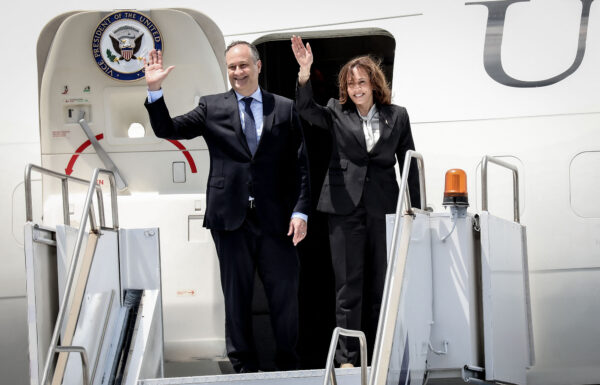
Tibor notes that although China and Russia currently have “an entente of convenience” on certain geopolitical themes—such as replacing the “rules-based” international system with more of a multipolar world order of powers—”their goals in Africa are different.”
“For China, it’s tying Africa to its global system of providing raw materials for China’s industrial and technological exports and supporting China’s global influence in multilateral fora,” he told The Epoch Times.
“For Russia, it’s much more opportunistic and transactional, rather than strategic. Poke the West in the eye wherever possible, and enrich Russian friends of [Presicdent Vladimir] Putin with gold and other riches through ventures such as Wagner.”
This flurry of visits by top figures in the US administration—with President Joe Biden himself planning to visit later in the year—reflects a growing awareness that the United States needs to deepen its engagement with the continent.
Meservey says the U.S. diplomatic charm offensive is not unconnected with the recent series of votes at the UN where about half of Africa’s countries refused to condemn the Russian invasion of Ukraine.
“It was a brutal reminder, or perhaps even a revelation for some, of how weak American diplomatic influence is with many African countries, including on issues that are important to the U.S. concerning China,” he said.
“The administration is trying to improve on that.”
Tibor insists no single visit by any U.S. official is likely “to offset” China’s influence and engagement. It must be part of a process, he says.
“For the United States to truly be credible about giving Africa the importance it merits requires investing the resources in U.S. activities on the continent—its diplomatic presence— that the United States has in other world regions.”
U.S. embassies in Africa tend to be fewer, with a smaller staff, and more junior people, than U.S. embassies elsewhere, according to Tibor.
“Imagine a country with over 100 million people in Europe, for example, which would only have one U.S. diplomatic office. Yet that is the case with Ethiopia. Imagine if there had been a U.S. consulate in Mekelle, maybe the Tigray conflict could have been averted.”
